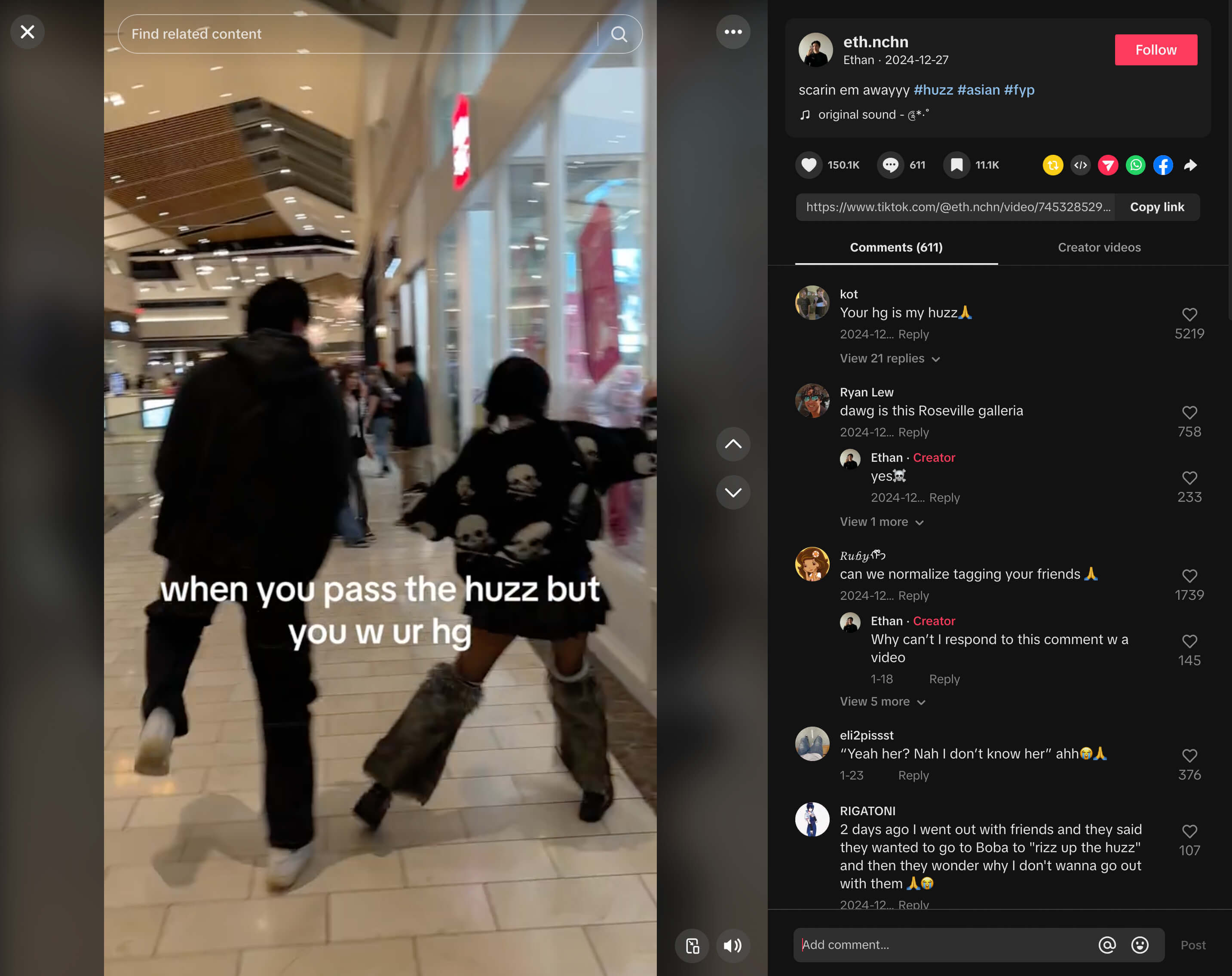Decoding 'Huzz': Understanding Gen Z & Alpha's Latest Slang
Table of Contents
- The Genesis of "Huzz": From Obscurity to Online Sensation
- Unpacking the Core Meaning of "Huzz": A Modern Lexicon Entry
- The Role of Social Media: "For the Huzz" on TikTok
- The Dual Nature of "Huzz": Informal vs. Offensive
- Beyond the Slang: "Huzz" as an Expression of Excitement
- Who's Using "Huzz"? The Demographics of a Modern Term
- Navigating Modern Slang: Why Understanding "Huzz" Matters
- Conclusion: The Ever-Evolving Language of Youth
In the ever-evolving landscape of language, particularly among younger generations, new words and phrases emerge with remarkable speed, often leaving older generations scratching their heads. One such term that has recently piqued curiosity and sparked conversations is "huzz." This seemingly innocuous four-letter word carries layers of meaning, reflecting shifts in communication and social dynamics within Gen Z and Gen Alpha. Understanding "huzz" isn't just about knowing a new piece of slang; it's about grasping the nuances of contemporary youth culture and the informal linguistic codes that shape their interactions.
From TikTok trends to casual conversations, "huzz" has woven its way into the digital lexicon, prompting many to ask, "What is huzz, exactly?" While its usage might appear straightforward at first glance, like many slang terms, "huzz" possesses a dual nature – capable of being used informally and playfully, yet also carrying a potential for offense. This article aims to demystify "huzz," exploring its origins, its various applications, and the important considerations surrounding its use, ensuring you're well-equipped to navigate this lively little word.
The Genesis of "Huzz": From Obscurity to Online Sensation
The journey of a word from obscurity to widespread recognition in the digital age is often remarkably rapid, fueled by social media platforms and influential personalities. The term "huzz" is a prime example of this linguistic acceleration. While its exact etymological roots might be debated, its recent surge in popularity is clearly linked to the digital sphere. According to observations by linguists and content creators, such as Lindsay, who highlighted "huzz" alongside "bruzz" and "gruzz" in a new Instagram reel, this word represents a fresh wave of vocabulary adopted by younger demographics. Lindsay's work in identifying and explaining these emerging terms underscores the dynamic nature of Gen Z and Gen Alpha's linguistic innovations.
A significant catalyst for the popularization of "huzz" has been its adoption by prominent online figures. Specifically, the data indicates that "huzz or huss is a slang term popularized by Twitch streamer Kai Cenat." Kai Cenat, known for his engaging live streams and massive online following, possesses the kind of influence that can rapidly disseminate new slang across vast audiences. When an influencer of his caliber uses a word, it quickly becomes part of the shared lexicon of their viewers, who then propagate it further across various social media platforms. This organic, yet accelerated, spread is characteristic of how many modern slang terms gain traction, moving from niche online communities to more mainstream usage, defining what is huzz for a generation.
Unpacking the Core Meaning of "Huzz": A Modern Lexicon Entry
At its heart, "huzz" is a contemporary slang term primarily used by Gen Z and Gen Alpha. Its core meaning, as articulated by various online sources and linguistic observations, revolves around a specific demographic. When people ask "what is huzz urban dictionary" or encounter it in their DMs, they are likely encountering its most prevalent modern interpretation. It's a term that has emerged from the informal communication styles prevalent in digital spaces, reflecting a desire for new, stylized expressions.
"Huzz" as a Stylized Term for "Women"
The most common and significant meaning of "huzz" in current usage is as a different, stylized way of saying "hoes," meaning a group of women. This might sound jarring at first, given the historically pejorative connotations of "hoes," but "huzz" often attempts to soften or modernize this older term, albeit with varying degrees of success. It is frequently used as slang for girls, usually attractive ones. The intention behind using "huzz" rather than "hoes" can be complex; sometimes it's an attempt to sound more current or less overtly aggressive, but the underlying meaning remains closely tied to its predecessor.
The informal nature of "huzz" means it's typically found in casual settings, among peers, and within online conversations rather than formal discourse. Its primary function is to refer to a group of women, often in a context where their presence or attention is a factor. Understanding this direct link to "hoes" is crucial for comprehending the full scope of "huzz," as it inherits some of the baggage and implications of the older term, despite its newer packaging. This connection is vital when considering the ethical implications of using "huzz."
Contextualizing "Huzz": Parties, Attention, and Social Circles
The application of "huzz" extends beyond a simple definition; its meaning is often shaped by the context in which it's used. Calling some girls the "huzz" is often delegated to a party or any social gathering where young people are present. In such environments, "huzz" serves as a collective noun, a shorthand for the female attendees, particularly those who are perceived as attractive or desirable. It's a term that signifies a specific social dynamic, often implying an element of observation or pursuit.
The phrase "for the huzz" further exemplifies this contextual usage. On TikTok, a platform known for its trends and viral content, the term "for the huzz" means that you’re doing something to get the attention of women around you, who are called "huzz" (a slang term for hoes). This phrase highlights the performative aspect of some online content, where actions are undertaken with the explicit goal of attracting female viewers or participants. Whether it's a dance, a challenge, or a comedic skit, the motivation behind such content is often to appeal to the "huzz," thereby gaining likes, shares, and social validation. This specific usage provides a clear window into the social currency associated with "huzz" within digital youth culture, defining what is huzz in a behavioral context.
The Role of Social Media: "For the Huzz" on TikTok
TikTok, with its short-form video format and algorithmic virality, has become a primary incubator and disseminator of modern slang, including "huzz." The platform's rapid content consumption cycle and emphasis on trends mean that words and phrases can go from niche to mainstream in a matter of days. The phrase "for the huzz" is a perfect illustration of how "huzz" functions within this digital ecosystem. It's not just a standalone word; it's embedded in specific actions and motivations prevalent on the platform.
When creators make content "for the huzz," they are essentially creating content designed to appeal to, impress, or entertain women. This can manifest in various ways: showcasing physical attractiveness, demonstrating skills, displaying wealth, or engaging in humorous antics. The underlying aim is often to garner positive attention, whether in the form of comments, follows, or direct interactions. This phenomenon reflects a broader trend of online performance, where individuals curate their digital personas to achieve specific social outcomes. The prevalence of "for the huzz" on TikTok underscores the term's strong association with youth culture, digital interaction, and the pursuit of social validation. It shows how a simple slang term like "huzz" can encapsulate complex social behaviors and aspirations within a digital context.
The Dual Nature of "Huzz": Informal vs. Offensive
One of the most critical aspects of understanding "huzz" is recognizing its inherent duality. While it might be used casually among peers, its close association with the term "hoes" means it carries a significant risk of being perceived as disrespectful or offensive. This is a common characteristic of many slang terms that originate from or are closely related to derogatory language. The intention of the speaker does not always dictate the reception of the word, and this is particularly true for "huzz."
The Fine Line: When "Huzz" Crosses into Disrespect
The data explicitly states that "huzz is a gen z and gen alpha slang word meaning slang for girls, usually attractive, sometimes used in a disrespectful way." This highlights the crucial caveat: while it can be used informally, its potential for offense is ever-present. Just like the term "hoes," it can be used in an offensive manner to degrade or objectify women. The casual use of "huzz" might stem from a desire to fit in, to use "cool" new slang, or simply out of ignorance of its full implications. However, when directed at individuals or groups of women, especially outside of very specific, mutually understood contexts, it can easily be perceived as demeaning.
The line between informal slang and outright disrespect is often blurry in youth language, but for terms like "huzz" that derive from historically derogatory words, that line is perilously thin. The power of language lies not just in its literal



Detail Author:
- Name : Judy Blick
- Username : pcronin
- Email : tcollins@gaylord.com
- Birthdate : 1997-01-23
- Address : 8646 Carley Course East Johnathan, DE 89626
- Phone : 331-926-4321
- Company : Paucek PLC
- Job : Biologist
- Bio : Quisquam earum ut suscipit at. Vitae fuga ipsum neque placeat sed adipisci blanditiis. Dolor nobis esse in voluptatem et consequuntur.
Socials
instagram:
- url : https://instagram.com/msporer
- username : msporer
- bio : Maiores fugiat ratione rerum vitae. Quo et accusantium rerum et facilis at iusto.
- followers : 6932
- following : 2624
facebook:
- url : https://facebook.com/maybelle_sporer
- username : maybelle_sporer
- bio : Et et mollitia est asperiores possimus nobis.
- followers : 3802
- following : 2767
twitter:
- url : https://twitter.com/sporer2000
- username : sporer2000
- bio : Suscipit quaerat qui qui maxime. Repellendus aperiam eligendi occaecati nesciunt. Laudantium adipisci autem corrupti dolores omnis.
- followers : 6763
- following : 1438